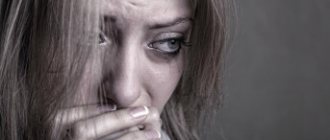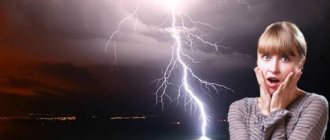Fear of going crazy
- one of the common fears (phobias) among urban residents of our time.
Of all the cases of such anxious experiences, the majority turn out to be just a peculiar reaction of the psyche to stress and overload, that is, there is no psychiatric illness behind this; proper rest and getting rid of the stress factor removes such fear.
But, although rare, such fear of “going crazy and getting a mental disorder” can really be a signal or symptom of some kind of mental disorder (usually in the initial stage of development of the disease).
What to do if you or your loved one were visited by such fear?
We advise you not to tempt fate and not wait to see what this will all lead to. Contact a psychotherapist or psychiatrist. One consultation with a psychotherapist or psychiatrist is enough to clarify whether this is overwork or, nevertheless, there are mental problems and therapeutic help will be required.
In both cases, the specialist will tell you what needs to be done: if it is overwork and a reaction to stress, then how to properly rest and recuperate; if it is a symptom of a disorder, then what kind of help is needed (psychotherapy or medication, whether it is necessary to be examined, etc.)
OCD fear of going crazy
Daria
2031 views
March 11, 2021
Good afternoon, I have already written here about my fear of schizophrenia and psychosis. I'm just desperate. Well, I have this fear in my head so much that I already catch myself thinking that I’m trying so hard to convince myself and my brain that I’m already crazy. I have control over words/actions/sounds/thoughts/feelings 24/7. Here’s the case today: my husband and I are riding on the subway on an escalator, he is driving ahead of me. I see that he has something in a bag in the side pocket of his backpack. I'm starting to wonder what this is. At first I thought: “Well, I don’t know what this is and to hell with it,” but then a really obsessive thought appeared: “How come, I have to find out what it is.” In the end, I asked my husband, and he replied that it was a black face mask in a bag. I calmed down literally for a minute. Then I became so scared that it was definitely a sign that I was going crazy, since I couldn’t cope with my control and desire to check. As a result, I have anxiety every day, from morning to evening, and it goes away a little in the evening. The anxiety is so strong that everything floats before your eyes, your head is spinning, it feels like it will literally explode soon from anxiety and thoughts. When I try to sleep during the day, I fail, because when I fall asleep, any sound (the cat opened the door, walked in, etc.) causes terrible fear in me and I give up this flexible activity (I mean daytime sleep). I can't let go of control. And it all started, as I wrote earlier, with the coronavirus. I used to have neurosis, panic attacks, I successfully treated it several years ago and have already forgotten. But in November, after Covid, something terrible began to happen in my head. I didn't have ok before. And this is precisely the diagnosis that the PT gives me. And I’m trying to reassure myself that this is just a neurosis, but a very obsessive thought is in my head: what if Covid has disrupted the work and structure of the brain and I’m now going crazy, as a complication of Covid (((I’m getting so scared. And this hell continues for 1.5 months now. I go to PT sessions every week. But it doesn’t help me. It’s getting worse and worse. I’ve already asked her to write me a prescription for the drugs that you recommended here, but she refuses, she says that I I can handle it on my own. I just need time. But I understand that I’m already under control and anxiety, I can’t handle it on my own. Should I change my PT and go to a psychiatrist? I’m very afraid to go to him, because there’s any hint that there’s something wrong with my head not everything is in order, it will lead me... I can’t even imagine what a strong level of anxiety. Could Covid really have such an impact on the psyche? Is it fixable. Life is a burden. I don’t have bad suicidal thoughts, I love life very much, and I want to live without anxiety neurotic But now I'm just like a frightened kitten, crammed into a corner out of fear. And I have two children. And they have a huge feeling of guilt that I can’t cope with my condition. I just don’t know how to survive this hell, there’s no other way to describe it. Or maybe I'm already going crazy?
The question is closed
Anxiety disorder after covid ocd
Misconceptions that accompany fear (the most common ones are given)
- You won't find good doctors;
- Go to a fortune teller, sorcerer, psychic and similar “specialists”;
- It’s better not to share this fear with anyone, otherwise they will “turn away from me”
- If I get “crazed,” it will be passed on to my children and affect my family and environment;
- It is better to endure and not take any measures so as not to make things worse;
- Most people are crazy, and in general “the world has gone crazy.”
All of the above are indeed misconceptions that “wrap up on their own,” increasing mental suffering and delaying a trip to a specialist.
If a mental disorder or behavioral disorder is suspected, there are examination methods that allow the doctor to objectively confirm and clarify the conclusion about the presence (or absence) of the disorder: pathopsychological, neuropsychological studies, tests (including genetic, epigenetic), electroencephalography, etc.
- We do not register
- We will not “heal” you
- Our doctors are not crazy who diagnose everyone
If you do not consult a doctor, or go to “non-traditional” sorcerers, bioenergy therapists, clairvoyants, psychics, then this will only deepen and prolong the disturbing experiences, since the necessary help will not be provided.
The fear of going crazy and developing a mental disorder is not inherited.
Persons susceptible to lysophobia
About 20% of people are potentially predisposed to developing obsessive fears. Phobias, as a rule, are the lot of people with insufficiently strong, unstable psyches.
Therefore, the “risk group” for developing lissophobia includes:
- suspicious people who are not satisfied with their lives;
- individuals with neuroses, depression and vegetative-vascular dystonia;
- people in whose family there have been recorded cases of mental disorders;
- individuals with other phobias and disorders that are accompanied by panic attacks.
- Elderly people are at particular risk. They are afraid of dementia, afraid of dementia (senile dementia, senile insanity).
- Personal psychological trauma is another cause of fear. If a person witnesses someone's madness, then there is a high probability that he will be afraid that the same thing will happen to him. In addition, fear may arise after personal experience of treatment for any mental disorder.
Help with fears at the ROSA clinic
- Experienced and sensitive specialists: psychologists, psychiatrists, neurologists and psychotherapists;
- We advise adults, teenagers and children;
- Licensed and certified in all types of assistance for mental and nervous system disorders;
- We work around the clock;
- Conveniently located: near the metro, free parking;
- Anonymous and confidential;
- If necessary, there is the possibility of placement in your own comfortable hospital.
If you or your loved ones are overcome by fears or obsessive thoughts, call us, we will help.
Categories
AllergistAnesthesiologist-resuscitatorVenereologistGastroenterologistHematologistGeneticHepatologistGynecologistHomeopathDermatologistPediatric gastroenterologistPediatric gynecologistPediatric dermatologistPediatric infectious disease specialistPediatric cardiologistPediatric ENTPediatric neurologistPediatric nephrologistPediatric ophthalmologistPediatric psychologistPediatric pulmonologistPediatric rheumatologistChildren Chinese urologist Pediatric surgeon Pediatric endocrinologist Nutritionist Immunologist Infectious disease cardiologist Clinical psychologist Cosmetologist Speech therapist ENT and Mammologist Medical lawyer Narcologist Neuropathologist Neurosurgeon Nephrologist Nutritionist Oncologist Oncourologist Orthopedic traumatologist Ophthalmologist Parasitologist Pediatrician Plastic surgeon Proctologist Psychiatrist Psychologist Pulmonary OlogistRheumatologistRadiologistReproductologistSexologist-AndrologistDentistTherapistTrichologistUrologistPharmacistPhysiotherapistPhytotherapistPhlebologistPhythisiatristSurgeonEndocrinologist
“We live like in the Stone Age”
Two weeks ago I completely stopped taking antidepressants. At the beginning I had bad thoughts and a bad general condition, but now I felt inner peace. I figured out all my problems.
What prevented you from solving the problem earlier? I just didn't know there were such ways. This is general illiteracy; education is needed in schools and universities.
I have a friend who works for a large consulting company. She says that a lot of people leave them with neuroses, because they work too hard for days, they want to achieve the beyond, they break down. It's very common, but no one talks about it. Everyone thinks that this is a shame, there is no need to work with it, there is no need to solve this problem. And this is how we live, like in the Stone Age.
“I slept all autumn and winter, perhaps that saved me”
Alisa, 29 years old
Bipolar II disorder, borderline personality disorder, phobic anxiety disorder
I recovered from Covid in July 2021. The first two weeks I felt only physical discomfort, I did not experience anxiety or fear. Self-isolation did not frighten me, I was even happy inside, since I have agoraphobia and social phobia. After three weeks [of self-isolation], I finally received a negative Covid test. But after a week the joy was replaced by constant anxiety, which was difficult to control even with medications. I almost stopped sleeping, practically refused to eat. A deep depressive episode began. For the first time, I decided to stop fighting and commit suicide. The decision was balanced and, as it seemed to me, quite reasonable. I was saved. But the depression lasted until April 2021.
My daily dose of antipsychotic was increased and another antidepressant was added. Throughout the years that I have been sick, I have often developed resistance to certain drugs, and there was very little choice among drugs. Now I take an antipsychotic, a mood stabilizer, two antidepressants and an anxiolytic.
I slept through the entire fall and winter, and perhaps that saved me.
Most psychiatrists attributed the deterioration [of mental health] to anxiety due to the pandemic. My psychiatrist simply shrugged his shoulders and said that “it’s hard for everyone now, and with your course of the disease, an exacerbation is quite understandable.” He insisted on returning to [talk] therapy because “borderline personality disorder cannot be cured with pills alone.” The fact that coronavirus causes “side effects” in mentally ill people was not initially studied at any biological level.
AlisaPhoto: Alena Agadzhikova
Now my condition is unstable, but much better than it was. In addition to the aggravation, Covid affected the financial sector: I lost my job. But I have a very understanding family, so now I live with my parents. The most frightening thing is the consequences of coronavirus. I worry about my parents - their age, chronic illnesses, my mother also lives with a mental disorder.
For those who may be experiencing post-Covid symptoms, I would like to advise, first of all, not to be afraid to feel sorry for yourself, turn to those close to you and ask for help if you can’t cope yourself. If you have the strength, read about mental enlightenment; many [Telegram channels] have a chat where you can share your feelings and fears. Another attack was saved by the girl on the hotline. We talked for three hours, and I decided to postpone the suicide until later. Every day I told myself that I could do this tomorrow. That's how I got out. Remember: “Everything passes, and this too shall pass.”
Categories
AllergistAnesthesiologist-resuscitatorVenereologistGastroenterologistHematologistGeneticHepatologistGynecologistHomeopathDermatologistPediatric gastroenterologistPediatric gynecologistPediatric dermatologistPediatric infectious disease specialistPediatric cardiologistPediatric ENTPediatric neurologistPediatric nephrologistPediatric ophthalmologistPediatric psychologistPediatric pulmonologistPediatric rheumatologistChildren Chinese urologist Pediatric surgeon Pediatric endocrinologist Nutritionist Immunologist Infectious disease cardiologist Clinical psychologist Cosmetologist Speech therapist ENT and Mammologist Medical lawyer Narcologist Neuropathologist Neurosurgeon Nephrologist Nutritionist Oncologist Oncourologist Orthopedic traumatologist Ophthalmologist Parasitologist Pediatrician Plastic surgeon Proctologist Psychiatrist Psychologist Pulmonary OlogistRheumatologistRadiologistReproductologistSexologist-AndrologistDentistTherapistTrichologistUrologistPharmacistPhysiotherapistPhytotherapistPhlebologistPhythisiatristSurgeonEndocrinologist
Recommendations
To avoid the manifestation of inadequate brain reactions to what is happening around you, you need to train it. Periodic changes in activity, rest and new experiences are a lifeline for a workaholic.
If a person, due to circumstances, does not work or is lonely, he needs to find a hobby. Get a pet or do charity work. Helping others will distract you from focusing on your own personality and relieve brain activity. If there is a sudden manifestation of “extrasensory” abilities or uncontrollable conditions, you must immediately consult a doctor.
VSD: astheno-neurotic syndrome
Modern experts believe that vegetative-vascular dystonia occurs as a result of stressful influences, as a result of which the functioning of the body’s systems is disrupted. Many people believe that neurosis and VSD are the same thing, but this opinion is erroneous. Various types of neuroses are common disorders that accompany VSD. However, most often when examining patients, astheno-neurotic syndrome is revealed.
When the nervous system is depleted in a person, astheno-neurotic syndrome is formed, the main manifestations of which are:
- emotional instability;
- high fatigue, which occurs even with minimal loads;
- drowsiness;
- feeling of weakness;
- cardiopalmus;
- trembling in the body.
Modern specialists use effective methods to restore normal functioning of the nervous system and neutralize the manifestations of VSD. When patients present with signs of impairment, the attending physician prescribes a comprehensive diagnosis to determine the degree of clinical manifestations and causes of the impairment. Based on the diagnostic results, methods are determined that need to be used as part of complex therapy.
The specialists at the Yusupov Hospital treat every patient with care. The coordinated work of the medical staff and other employees of the Yusupov Hospital is aimed at providing quality services in conditions of increased comfort.
Treatment
It should be understood that losing control of oneself is not always as scary as it seems; millions of people experience such fear. Every day we risk something, and sometimes losing control of ourselves is useful in terms of psychological relief. We are talking about the loss of control over emotions: you can cry right in public and not be afraid of condemnation, throw a tantrum with breaking dishes, tearing old clothes. This method of psychological unloading will help release all stagnant emotions, after which the desired relief will come, fear and panic will go away. Having thrown out all the grievances, you will experience relief, an incentive to live will appear, and all due to the release of adrenaline into the blood.
Psychotherapy sessions will help you overcome fear, where you describe in detail your fears, mental and physical state. If necessary, the psychotherapist will prescribe you sedatives that will relieve irritability and relax you. They may also recommend a massage aimed at relaxing the muscles of the spinal region.
You can use the method of letting go of the problem yourself. Its essence is as follows: it is necessary to outline fears and problems on a landscape sheet. Take a pen and sit down to write a letter without an addressee.
Write how difficult it is for you to live, explain why this happens, describe all your grievances and immediately forgive your offenders. When everything is written, do with the sheet in any way. Destroy. You can burn it or tear it into small pieces.










